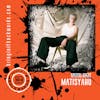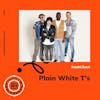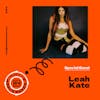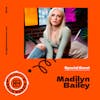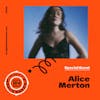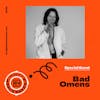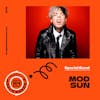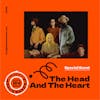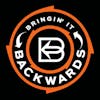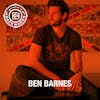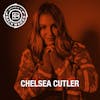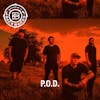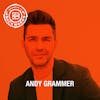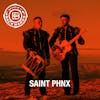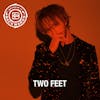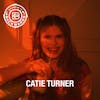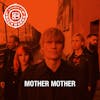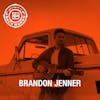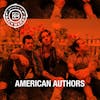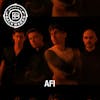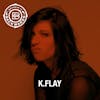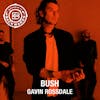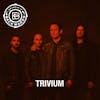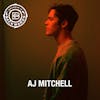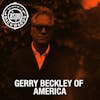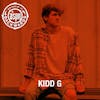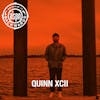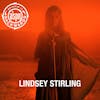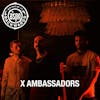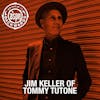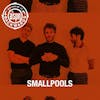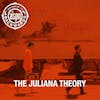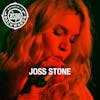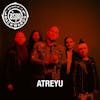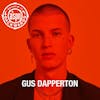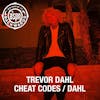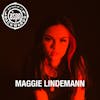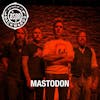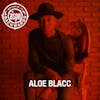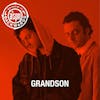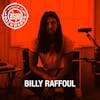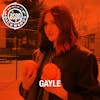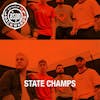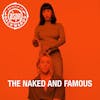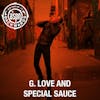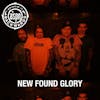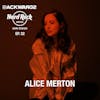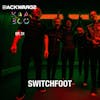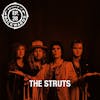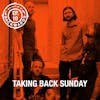Interview with The Ballroom Thieves
We had the pleasure of interviewing The Ballroom Thieves over Zoom video!
While never shying away from topics and ideas they are passionate about, The Ballroom Thieves – Martin Earley and Calin Peters – have charmed fans around the country. Their...
We had the pleasure of interviewing The Ballroom Thieves over Zoom video!
While never shying away from topics and ideas they are passionate about, The Ballroom Thieves – Martin Earley and Calin Peters – have charmed fans around the country. Their catalog has amassed hundreds of millions of streams, garnered key press (NPR Music, Rolling Stone, The Washington Post) and radio support, and gained a loyal live following, with sold-out shows and festival spots at Boston Calling, Newport Folk, and Calgary Folk.
After a major car accident, the onset of the pandemic, and the departure of a band member, the duo have been learning to roll with the punches. "We were able to step away from a lot of the big three-part harmonies and for the first time we recorded most of the album live. We try to let change inspire us, even when it comes with difficulty.“ It’s an artistic statement that doubles as a life mission.
The pair both emphasize that they’ve learned to navigate complicated situations, including their struggles with depression, which often color their songs. If they can impart anything to listeners, it’s that talking about mental health is not a weakness—and that sharing any of life’s trials can be a source of strength.
We want to hear from you! Please email Tera@BringinitBackwards.com.
www.BringinitBackwards.com
#podcast #interview #bringinbackpod #TheBallroomThieves #NewMusic #zoom
Listen & Subscribe to BiB
https://www.bringinitbackwards.com/follow/
Follow our podcast on Instagram and Twitter!
https://www.facebook.com/groups/bringinbackpod
We'd love to see you join our BiB Facebook Group.
Hello! It is Adam. Welcome back to bringing it backwards. A podcast where both legendary and rising artists tell their own personal stories of how they achieve stardom. On this episode, we had a chance to chat with Kelly and Martin of the ban. The ballroom thieves over zoom video, Kelly was born and raised in Boston and Massachusetts and talked about how she got into music was always drawn to the cello. So she played cello pretty much. Your entire life was in the orchestra through middle school and high school, and eventually attended Berkeley college of music as a cello player. Martin on the other hand was born in Switzerland and didn't move to the United States until he was 13 moved to Maine. 3 (2m 9s): We talk about the massive culture shock there Martin's dad was always in a band, but his parents Martin's grandparents didn't want him to pursue a career as a musician. So now he's kind of living vicariously through through Martin, which is really cool. Martin played in bands, picked up drums at a very early age. I think six or seven is when he learned drums later, picked up guitar and started writing songs, doing a singer songwriter thing. Eventually met Kelly at a show. Her band was opening up for the barroom thieves. They had a couple of records out already. When Kelly joined the band, they tell us about playing different college shows the progression of their career. Putting out a record independently. 3 (2m 50s): They shopped it around to a bunch of labels. Nobody wanted it, they put it out. And their biggest song was on that album song called BS, which ended up leading them to their most record deal. And we hear all about this new record they have, which is written all during the pandemic. And we also hear where they were when the pandemic hit and the shows that they were playing when it all kind of happened, as well as the story behind the song, Harry styles, you can watch our interview with Kelly and Martin on our Facebook page and YouTube channel at bringing it backwards. It would be amazing if you subscribe to our channel like us on Facebook and follow us on Instagram, Twitter, and Tik TOK at bringing back pod. And if you're listening to this on Spotify, apple music, Google podcasts, we would love it. 3 (3m 34s): If you follow us there as well, and hook us up with a five-star review, 4 (3m 39s): We'd appreciate your support. If you follow and subscribe to our podcasts, wherever you listen to podcasts, 3 (3m 45s): We're bringing it backwards with the ballroom thieves. This is about you, both in your journey and music. And obviously we'll talk about the new stuff you have point out with ballroom thieves. 5 (3m 55s): Okay, great. Can we just say, just so you know, right off the bat, we're recording our audio separately from the video, you're recording the video, right? 3 (4m 7s): I record the video and the audio too. I mean, the zoom file, usually the audio that comes from zoom is usually really good. I mean, I don't know, they have some sort of compression on it and it comes out pretty good. And then I tweak that even more after the fact. 5 (4m 21s): Okay, cool. We can send you an audio file of our, our side of the audio, if you want it, otherwise it's up to you. Okay. 3 (4m 29s): I think it will be all right. I appreciate it though. Thank you so much for, for doing that. People have sent it in the past and then it, it always sounds great. And then it just, oh my God. It's all right. It's not, I mean, if you're an audio guy, you could figure it. You could hear it, but if not, it's kind of like, it becomes more of a process than necessary, I think for most people. But I do appreciate it. Thank you so much for doing that. 5 (4m 51s): Yeah, no problem. 3 (4m 52s): Awesome. Again. So this is about you both and your journey in music. The band started in Boston. Is that what I read? 5 (4m 58s): Yeah. Yeah. 3 (5m 0s): Are you both from Massachusetts? 5 (5m 4s): No, Kelly. Kelly's from Massachusetts. I grew up in Europe and then moved to Maine with my family and when I was 13. 3 (5m 12s): Oh, wow. Okay. So Kayla you're from you're from the Boston area. Yeah. Talk to me about that a little bit. And then I'm curious about Martin where you grew up. 6 (5m 21s): Yeah, I was born in Boston and my family moved to Franklin, Massachusetts. Not long after 3 (5m 29s): The suburb of Boston. I'm so familiar. Okay. 6 (5m 32s): Yeah. Yeah. It's about an hour from Boston. I love Boston. I lived there for a decade from college till after I miss it every day. 3 (5m 43s): Okay. Or you're not there anymore. Are you both? You're obviously. Okay. Did you move to LA or 6 (5m 48s): No, we're wearing Wiscasset Maine. 3 (5m 51s): Oh, red. Okay. 5 (5m 53s): We wish we lived in LA, especially right now in the winter 3 (5m 57s): Call. I could call. Awesome. Well, how did you get the music then? Cali. 6 (6m 1s): Ah, you started playing cello when I was 10. And we just went from there. 3 (6m 8s): What drew you to cello? Like a family member or anyone in your family? Musical at all? 6 (6m 12s): No. The cello itself drew me in. Good to me. Yeah. I always like to say that it chose me, 3 (6m 20s): Chose you. And then you just continued with that throughout high school, college and on. Yep. Wow. That's impressive. That's cool. I, what about you Martin? So you said you grew up in Europe apart. What country? Born and raised where we, where did you come from? 5 (6m 33s): I grew up in Switzerland in near Basel. So the Northwest corner of Switzerland and yeah, my mom is Swiss. My dad is American. And so I grew up there and lived there until I was 13. And then we all, me and my family, we all moved to Maine. 3 (6m 52s): What was, was your, your parents got a different job or like what took you guys from Switzerland to Maine? 5 (6m 58s): Yeah, it was my dad's job. My dad got a job, he's an architect. And so he lost his job over in Switzerland, but there was always kind of a, you know, a plan underneath everything of trying to move to the U S at some point. And so then they just took that opportunity and yeah, as the kids didn't have too much of a say in the matter, so 6 (7m 20s): I always have a secret plan. 3 (7m 22s): Yeah. That's awesome. Was that culture shock moving from Switzerland here or to main I should say. 5 (7m 29s): Yeah. I mean, it wasn't, it wasn't easy. That's for sure. I mean, the language barrier was really tough at first and, and yeah. I mean, you know, it's tough when you're 13 in middle school saying goodbye to all your friends and all the people that, you know, and, and moving to a brand new place and especially Maine, Maine is very rural. And so, you know, I went from a place where you can take a train and a bus to literally anywhere in Europe, to a place where you need a ride, if you want to go anywhere. So, yeah. So it was, it wasn't easy. 3 (8m 6s): Was it hard? It's interesting. I would never have guessed that you didn't like English was not your first language. Like to be honest, like 6 (8m 14s): It's like better than most English speakers. I think. 3 (8m 17s): I know. Wow. Was that a hard to adapt native? Yeah. Was it hard to adapt to that? 5 (8m 22s): It's definitely 3 (8m 24s): Tricky language too. From what I hear. 5 (8m 26s): Yeah. I mean, I grew up, I grew up listening to it. My dad spoke English with his friends every night, you know? So we, we sound like we never heard it, but never took any lessons or anything. But then, yeah, so, so the first couple months moving in seventh grade were pretty rough. I just sat in the back of the classroom and just like trying to pick up pieces here and there, but I don't know. It just, once, once we moved, my parents said, you know, we're not going to speak German to you while we're there, you know, initially. And so we were just kind of thrown into the fire and once you're forced to learn a language, especially at a younger age, you, you can pick it up pretty quickly. 3 (9m 7s): Wow. That's really impressive. Yeah. Like I said, I would never have guessed in a million years that English was not your native language, but when, and how did you get into music? 5 (9m 19s): My dad played music. He played guitar and his parents never allowed him to pursue it as a career when he was younger. So my parents were always very supportive of music and the arts in general. And yeah, I took drum lessons when I was six or seven, maybe a little later than that. And then when I was in high school, I wanted to learn the guitar. And so my dad taught me a couple chords and, and then I just kind of taught myself from there. And yeah. 3 (9m 50s): Why, why the drums? Why'd you start on drums, just interested in those. 5 (9m 53s): I was interested in him. My dad was in a band and I really liked the drummer. He was a really nice fun guy, you know, so I, I just gravitated towards it. And I just, I liked the idea of, of hitting stuff and making loud noises. And my parents, my parents liked to say that they wanted, they got me a drum set so that I could let out some of my energy and anger or whatever. And, and, you know, because I would keep it inside a lot. So mental health, 3 (10m 23s): That's funny. That's my, my younger son is turning six next, or may, I guess next month. And in the beginning of quarantine, when that all happened, he's just like so much energy. We bought him an electric jump set. We're like, here you go smash on this for a while. And we finally got them lessons this year. So it's funny or cool to see them like learning, you know, how to play different beats and stuff. So that's cool that you kind of want that same, you know, started out and then you eventually got guitar. You said your dad was in a band. 5 (10m 57s): Yeah. He was in a band growing up and he always wrote his own songs and he played guitar. So yeah. He taught me some, some chords initially and yeah. III, minor and G so I started off. 3 (11m 7s): Awesome. So he's, you said he's supportive, but like, I mean, that's really cool to kind of see his son doing this as like a career path. 5 (11m 15s): Yeah. I think he's, like I mentioned, his parents wouldn't let him, you know, pursue music. And so I think that was a big reason why he's, he's kind of living vicariously through, through me and another, another one of my siblings who also plays music, but yeah. 3 (11m 31s): Oh, okay. So you're, you're not the only one in the family then that pursued music then? 5 (11m 35s): No, w I have three, three sisters and one of them pursued music. The other two are in the arts. They, you know, they, they paint and draw and yeah. Typography everyone's yeah. Everyone's trying to do their best. 3 (11m 49s): That's amazing. And Kelly, so you play it, you said you started on cello, played cello. You played bass in the band though. Correct. Okay. That's what I thought. So when did you start playing bass? Was that later, or 6 (12m 3s): Maybe five years ago? Six years ago started playing for the bands We needed low end, you know, and I'm the low end zone. So I just took up bass. And now I, I really, I almost prefer it when playing in the band because I sing a lot and it's really hard to sing and play cello. I stand and play cello now too. And that's not the best way to play cello. So I don't, you know, I don't get like the greatest tone ever. And it's, it's a little sad. So with all the singing, I much prefer to stand straight and play the bass. It's just a lot easier. 3 (12m 39s): But you also played cello and sing in the band a bit. Yeah. 7 (12m 43s): Hey kiddo. How was the hell to learn anything? 8 (12m 46s): Yeah. That ripping power induces, spontaneous joy. 9 (12m 49s): The icon pass lets you do you at 50 destinations worldwide from 2 49 adult drop in for next winter now and save that icon. pass.com. 10 (12m 60s): Offer deadline on Oak street. 11 (13m 1s): Welcome to the housing market. I'm with Redfin and I'm here to help, 12 (13m 4s): But I need to sell my house. 11 (13m 5s): Great, Greg then charges a 1% listing fee when you buy and sell with us, which is more than half off the usual fee and saves you an average of $8,400. 12 (13m 13s): Oh, is that all? 11 (13m 15s): Yup. 13 (13m 16s): I'm kidding. You had me at 1%. 11 (13m 18s): Want to win? So that with Redfin it's real estate done, right? 10 (13m 21s): The warranty offers counter in five minutes. Average savings has Redfin refund. Plus 1% listing fee, subject to minimums, not available in all areas. Learn more redfin.com. 14 (13m 29s): You spend the first hour of your vacation at the luggage. Carousel thinking there's nowhere to go but up, but there is a place to go, but up because when you open your suitcase, you find it filled with dolls, dolls, like the ones in that movie that scared you so much. You wet your girlfriend's bed. Marissa. The one that got away, you returned the bag to the airport with relief at lasts. Until you get back to your room where a fallen door waits to greet you, 15 (13m 54s): Don't let a suitcase full of dolls, ruin your vacation, go on a real vacation, go rvs.com. 3 (13m 60s): And it's I've seen photos of you like he, you have this gigantic chill. I, I would imagine that being so hard to kind of, yeah, that's just above me. That's crazy. 6 (14m 10s): It's a stand it's like hard to get around it and sing at the same time, but, 3 (14m 16s): And just like where you can actually hold it standing up. Is that, or is that a totally different instrument? 6 (14m 21s): Well, bass, double bass is much bigger than cello. That would be taller than me. It's and the body would be bigger than mine, but the cello is about the same size as me really. And then there's an end spin at the end of a cello. So I, I pulled that out. Oh, a 3 (14m 38s): Longer distance so I can stand 6 (14m 40s): Up straight. Yeah. 3 (14m 41s): Interesting. Okay. And did you, do, did you go to college to pursue music or anything like that? 6 (14m 48s): I was in Boston. At Berkeley. At 3 (14m 49s): Berkeley. Oh, you didn't go to Berkeley. Okay. So you were in orchestra throughout your academic life? I would say. 6 (14m 58s): Yeah. It's really always classical stuff. I was in the pep band and the wind ensemble and high school as well. I play drums. 3 (15m 8s): Oh 6 (15m 9s): Yeah. I sang in the chorus and I just did as much music as possible. And then yeah. All, all classical stuff though until college. 3 (15m 19s): Okay. It's never like in a band like around town or anything like that? 6 (15m 23s): No, I was in, I was in a lot of quartets and we, I was in one quartet where we wrote our own music. So that was, that was my first time kind of writing and I loved that composing and then yeah, no, no bands until college. 3 (15m 41s): Okay. And then you ended up going to Berkeley. Did you also go to Berkeley Martin? 5 (15m 44s): No, I wouldn't have gotten in, 3 (15m 48s): Well, I, yeah. I'm curious on your story of getting into Berkeley. I've heard a lot of different kind of ways in and what was yours like a sight reading, come play, all this stuff audition or like what was your process to get into the school? 6 (16m 4s): It does change every bunch of years. Funny you say that when I got in, it was audition based. I applied, I fortunately did not have to share my sat scores Really great for me, not really much of a standardized test girl. So 3 (16m 22s): Nor am I, I had to take the MPS to somehow like even have a shot at college. I'm like I can do okay. If it's not just answering questions on sentence, 6 (16m 32s): What a crazy way to measure our intelligence. Huh? 3 (16m 35s): It's ridiculous. 6 (16m 36s): Inaccurate. 3 (16m 37s): But 6 (16m 38s): Yeah, so they took, they, they wanted me to audition and I prepared a classical piece and, and appellation, oh gosh, I can't even remember what it's called, but unimportant. I did some sight reading. I did some, some like ear training, which was cool. It was the only college that asked for that. They sort of, they play or sing you a little passage and you have to play it back to them. And I was really glad about that. Cause, cause I'm good at that. And I'm, I'm not as good at sight reading. So I think those scores maybe helped me get in. 6 (17m 20s): I, I didn't enjoy, you know, preparing all my scales and all the classical music and, but I'm glad that they asked for the, the ear training stuff. It was cool. It was a great experience auditioning to Berkeley. 3 (17m 33s): That's cool. Yeah. Like I said, I've heard so many different stories and somebody's like, yeah. They just like, let me in. I don't know. Or it's like, I just show up with a piece of music and like you said, like sight read on the spot and do all these different things. It's funny how they kind of, I guess it depends when you apply, they need people. 6 (17m 51s): That's okay. They change it all the time, which I kind of appreciate because there are so many ways to be a musician. And so I think they're just trying to find a good group of people to, to join their school every year or every semester. And I really enjoy that. They change it. 3 (18m 7s): I think it's really cool as well. And they, a lot of people I've spoke to also did the SA maybe this as well. There's like a summer program before you go to Berkeley. 6 (18m 16s): I didn't do that, but okay. 3 (18m 17s): People 6 (18m 17s): Go 3 (18m 18s): And gets like a taste of what it is and if this is something that we'll be able to do, but I, I would, I would think if they just started letting people in, because somebody told me like similar to what you just said, Martin like, oh, they wouldn't let me in. Or like, they let people in and then they're like failing out real quick. Cause it's like, I don't know how to do. I can't read music. I can't do this. Like I can write a great song, but that's not really, I guess all it takes when you're there. 6 (18m 43s): Yeah. There's a funny joke about Berkeley. I don't know how much it applies over the years as they changed the audition process. But people say it's easy to get in and it's hard to get out. 3 (18m 53s): Right, right. That makes sense. Or a lot of people will not finish. Right. Isn't that kind of part of it too. If you get a gig, it's like, well, why am I going to keep, you know, I'm I, I landed what I was here to do and I did it in a year and a half or, or whatever it may be finishing up at 6 (19m 10s): Berkeley. It did. Yeah. 3 (19m 12s): Very cool. And with 6 (19m 16s): My success, Sorry. 3 (19m 19s): No, no. So, so Martin, you came here to the states at 13 and your dad was in a band. Did he continue the band when he got here or start a new band? Or was that kind of that on, 5 (19m 30s): He kind of just, he played his own music by himself. And then over the years he joined another band and started a new one and yeah. So he's been in several, several bands since and yeah, cause he's currently loving his, his current bands. That's cool. Having a good time. Yeah. 3 (19m 47s): Do you guys ever jam with him? 5 (19m 50s): We not as much as we'd like. Yeah. I used to, when, when I lived at home and you know, in college, when I would go home for the breaks, I would go and, and join his rehearsals and hang out and play some music with them. And that's really fun, but Yeah, the holidays, yeah. 3 (20m 6s): Never pull them up on stage for a ballroom thieves show. 5 (20m 10s): Not yet. He would love to open up one of our shows with his band. 3 (20m 15s): That'd be so cool. That'd be really cool. That'd be great thing. So when do you start playing in bands? 5 (20m 21s): I started playing in bands in, in middle school, you know, just playing silly stuff, playing drums with a friend of mine. And then in high school 3 (20m 32s): Here, was that in the states when you got here or no? 5 (20m 34s): No, that was, that was back in Switzerland. So, you know, I was very young, but then in, in, in high school I started playing in a band with some friends and that didn't really do much. And, and then in college I just kind of played my own stuff. A lot of kind of concert, coffee house kind of things. And you know, solo, acoustic stuff. 3 (20m 56s): Did you, did you go to college for music or no? Having totally. No. 5 (20m 59s): Oh, I didn't know. I went, I studied philosophy and foreign languages. 3 (21m 4s): Oh cool. Very cool. Yeah. And you were doing singer songwriter thing and then how does then the band begin? 5 (21m 11s): Yeah. So after college I had this dream that, that, you know, the way to be a musician is to just tour and to just go and hit the road and you know, so I, yeah, so I tried to set up this whole like nationwide tour of my, my music and me and my friend Devin. We went to, you know, we just kind of set this up ourselves. So just email, different venues. And most of them would, would just send me an email back that said, Hey, you don't have a draw or anything. And here's the venue, here's the venue we recommend if you, you know, to establish yourself in the city. 5 (21m 53s): And it's usually just this like divey, shithole. Sorry if I'm, I don't know if I 3 (21m 58s): Can swear on 5 (21m 60s): This dive you shithole of a bar and you know, we'd show up and play for whoever the regulars were and, and we didn't make any money or anything. We, you know, we spent a lot of money on that trip, but it was a really fun experience to just kind of get out into the country and see, see what different places are like. So yeah. So then after that started working a desk job and I hated it and I kept the band going kind of as a hobby on the side. And then at one point I lost my job. I was laid off and, and at that point I was collecting unemployment and severance. And so I was like, well, might as well give this music thing a shot because if I don't do it now, I probably never will. 5 (22m 45s): So, yeah. And then things just kind of worked out in a way, the kept the ball rolling until now. 3 (22m 53s): And how do you meet Kelly and the rest of the members of the band? 5 (22m 57s): So, so we were playing with a cellist for about two years and then she left the band and then our, our initial member Devin met Kelly at an open mic. And Kelly, funnily enough, was playing one of her last shows with her band at the time at that open mic and the other person in the band and in her band at the time is now in our band. So it all kind of comes full circle. So she was playing, yeah, she was going to duo with this guy, John, who now has joined our band as our guitar player and synth player. 5 (23m 38s): And yeah. And then our, our fourth member Arielle who plays drums, we met him through the recording process. So we recorded at a place called dimensions, dimension studios in Boston and Arielle was an engineer there and a co-producer. And so he's worked on all of our albums, you know, since the very beginning. And yeah, so he joined kind of through that. We became friends and yeah, he's played every role in the band that there is. So 3 (24m 10s): And so once the band kind of starts, you know, you guys get your, your group together, what is the first kind of thing that can like, was there a moment that kind of validated the band? Like, okay, we need to keep, we should keep this going. Or like, was that after a bit of time, like, tell me, tell me about how the, you know, the ball started to get rolling with the, with the band. 6 (24m 30s): Yeah. It must be just so many little moments, 5 (24m 33s): Right? I mean, I think one of the big things that I always think about is PR for us, we started out playing a lot of college shows. And so it was a way there's a whole college circuit and colleges are some of the last places that actually have money for little known artists. And so, you know, you can actually make a living and, and, you know, be able to afford being a musician by playing these college shows and then kind of build your tours around the anchor dates of the college shows where you're actually getting paid some money, but they're not the shows. Aren't great, but you're getting, you're getting a decent fee 6 (25m 12s): Practice as well. Right. 3 (25m 14s): And there's probably a big built in audience there or not so much. 6 (25m 19s): Sometimes you have kids, you know, eating lunch with their headphones on and doing homework and they, they just would rather, if we were not there, so there's times, 3 (25m 28s): Sorry. Well, how does that work? Like I've, I've heard other artists talk to me about these college shows and I guess, and I'm thinking of a college show. I don't, I don't really even know what I'm thinking about. I think maybe I'm thinking of like a frat party or something, and that's probably not at all what you're talking about. 5 (25m 44s): It runs the gamut, it runs the gamut completely. It's like, if you can get anything from a, you know, big show with thousands of kids that are all there to see play, or you can get like a lunchtime, you play for 40 minutes while everyone's eating their lunch and no one's paying attention. So it's just anything in between draft parties included. 3 (26m 5s): So you reach out to college and say, Hey, we're a band. And we're we want to come through and play. Like, do you just reach out to this? If someone was listening and they're like, how do you do this? Like, what was the step? 5 (26m 16s): Yeah. There's 6 (26m 17s): College agency actually, 5 (26m 18s): Right? There's a, there's a whole circuit. It's called the NACA circuit and a CA and it's they do conferences. And so each region has its own conference once a year. And the way the conference works is essentially like a trade show where you get a booth as an artist. And you know, it's not just musicians, it's it's magicians or like any like speakers, anything that, any entertainment that could come to a college, you would find there. 3 (26m 47s): So then 5 (26m 47s): The colleges all send their representatives to these conferences and then they have showcases. And then they book people right there at the conference. And so you can set up, you can end up going to some of these conferences and end up with like 30 different college gigs, all in the same area of the country. So then you can kind of build your tour around that. 3 (27m 8s): That's amazing. That's a really cool thing. I didn't know that that mean that even existed. I'm thinking that you're like cold emailing the Dean, like, Hey, you know, you got 50 bucks. We'll come through and play some show. But wow, that's really interesting. I didn't know that at all. So it started there. You'd start doing the college circuit and start building just because you're playing so much in front of people, 6 (27m 32s): But you're, you're gathering a great audience in all these cities. You would not normally be able to play for enough people and be able to afford a tour. But if you're playing colleges, you're getting college students, people. And so as we grow as a band, these kids are growing up and now they're in their twenties and they can afford a ticket. And they remember us from college and they'll come see us again. So it was a great way to build our band. 3 (28m 0s): That's totally cool. 7 (28m 2s): Hey kiddo, how was the hell to learn anything? 8 (28m 4s): Yeah, that ripping power induces, spontaneous joy. 9 (28m 8s): The icon pass, lets you do you@fiftydestinationsworldwidefromtwofortynineadultdropinfornextwinternowandsaveiconpass.com. 16 (28m 18s): What if I told you, you could have a tax filing expert, knew your copilot for free. Sounds good. Right? When you file with tax act, you'll get expert assistance from a real person and it's free with all returns. They'll answer your questions and even help you with a quick review before you file. But a good thing doesn't last forever. You must file by April 7th to take advantage of this incredible offer. So hurry to tax act.com, where you file for less and get more Restrictions apply. See tax act.com for details. 17 (28m 49s): Turn any day into a parte with amazing cocktails made with Stella Rosa wines, like the tropical Stella Rosa Rita mixed Stella Rosa pineapple with orange liquor, tequila, guava juice and lime juice shake what your mama gave you then pour over ice and enjoy. Find more delicious drink recipes@stellarosawines.com slash cocktails, 18 (29m 14s): Stella rose, 17 (29m 16s): Stella, bright, responsibly. 3 (29m 18s): That is really cool. It's interesting that you said that. Yeah. Cause in your college kids there's, you don't have any money you're eating ramen or whatever. And then once you start getting older, I did radio for a long time and it's like the demo I was always in was 18 to 34 year olds. And like we'd have great numbers. And like all the top 40 stations are all, that's their demo, 1834. But if you look at the ad money, always to the classic Brock and the old stations, because those are the people that care about like Aflac or, you know, whoever like some, you know, insurance company or they're looking to buy a Kia or whatever it is. If you're 18 to 22, you're not paying much attention to that stuff. 3 (30m 0s): But it's funny that, but that's a great idea to kind of, they get older with your band and their band that they saw as small and you guys are progressing and they're progressing with you. And it's kinda like a cool, like I was there when, you know, they, they started type deal. 5 (30m 15s): We get, we get some people like that at a lot of shows. You know, people who are like, we saw you in the cafeteria at this college, you know, way back when, and it's great. It's not something that you don't want to stay in the college circuit. You don't want to call it 6 (30m 29s): Circuit. 5 (30m 31s): You want to get to a place where you're playing venues and yeah. But 3 (30m 36s): 40 plus instill in college circuit. 6 (30m 40s): Maybe some people make a whole career out of that. We shouldn't say 5 (30m 44s): You can totally do that. Yeah, yeah. Yeah. I just wouldn't want to, but 3 (30m 51s): When you say 2012, you put out the devil in the deep, is that your first record? 5 (30m 57s): That was the first. Yeah, it was an EAP. Yeah. It was the first thing we did. Yep. And we recorded it in Boston and yeah, 6 (31m 3s): I wasn't in the band yet. Right. 3 (31m 5s): When did you join the band then? Kelly? 6 (31m 7s): Oh gosh, 2014. 5 (31m 9s): I think. 6 (31m 9s): So I think so too, maybe 13. 3 (31m 12s): What was the first record then that you were on? 6 (31m 15s): I guess it was on a Wolf in the doorway. 3 (31m 17s): Okay. And from there on, and at that point that the college circuit was obviously still happening. That that was part of what, Okay. 6 (31m 25s): Yeah. Maybe for another couple of years. And then we still play one or two of those colleges and that's it. Yeah. They just, they have a great program. There's, there's actually an amazing one at Bates college. It's a beautiful room. A lot of people come, it's a listening space, so they really pay attention to the music and they buy Murcia after. And it's more like a normal show and they're just doing a great job. 3 (31m 51s): Very cool. What would you say the next big milestone? I mean, once you get out of the college circuit you have with the Wolf and the doorway, you have a full record out at this point. Like what was the next progression in the band? 6 (32m 5s): That's summer that summer, we, when we released a Wolf and the doorway, we played a couple of great festivals. I think this was the year that we played Boston calling in the spring. And then we played Newport folk festival for the first time in late July. And we played a lot, a lot of shows and a lot of festivals at that time. We were in the years where we could not say, no, we felt like we couldn't say no to anything. So we toured very hard and I think it benefited us very much. And along with those festivals, we felt just a slight bump and things were improving enough where we could move out of our apartments and just tour full time and really, really dive into the entire band and submit On your everything. 3 (32m 55s): That's the dream. Right? I mean, to be able to just make a living like a legitimate living off of doing what you love, you're going to say something Martin, go ahead. 5 (33m 4s): Yeah, it was, it was also the first time that we sold out a, like a bigger venue in our hometown in Boston. So we sold out the Sinclair in Cambridge, which is like a 625 cap room. So it just felt like, you know, once you, once you establish yourself in your hometown, then you can kind of make the case that, okay, it's working here. So it's going to work in other places too. And we can just kind of make the circle bigger and bigger and, and yeah, that's, that was kind of the plan from then on out. 3 (33m 35s): Wow. I think I watched an interview. You all did at Boston college. I was just kind of when I was doing research and I think it was you Martin, the kid asks a question and he S he said something and you're like, oh yeah, this is the first time there. You're like you said something about like the plus was that you got three tickets or something like that. And you're like, yeah. And I got three day passes and like that made it worthwhile. It was just really funny, like the answer that you gave to the kid and he was kind of like thrown off, but anyway, that's funny. So that's huge big moment sign at this big club. And then does things just kind of progress from that point? Was there a big, like spike in something? I mean, you have a huge song here on, on Spotify with bees. 3 (34m 18s): Was that something that happened early on or was that like a Spotify streaming thing that landed later? 5 (34m 24s): Yeah, it was funny. I mean, the Wolf and the doorway, we got our first label. And so that was kind of a big, it wasn't a huge spike or anything, but it was, you know, we, we were in with, right. 6 (34m 37s): So someone else believed in us besides just our team, 3 (34m 42s): That must have been cool to sorry to share with your dad. Right. Like, Hey, we're in this, we're in this band and it's working and we're signed to a label. Cause I bet that's what his, his goal is. His dream aside from his parents not being supportive. Do you remember calling him and telling him, 5 (34m 60s): Oh yeah, definitely. Yeah. I remember calling my parents and yeah, they're there, they've been so supportive and they're so proud of us. So it's a really nice relationship there. 3 (35m 10s): That's awesome. And when you signed to the label, what what's, what did they do for you? They put you as a, like an opener on a big tour or 5 (35m 17s): No, it wasn't very, it was a very small label. We already had a booking agent. And so we were just kind of, we were very busy for the next two years. We were barely at home. There was one year where we had 14 days at home, total in the year. Wow. So it was like, you know, we were just kinda traveling, seeing the country and playing tons and tons of shows. The 6 (35m 42s): Label really helped with financial support. And I think we learned a lot from this label as well because we don't, I don't, I don't think we understand quite how labels work in this world, but I, I think they should just be a bank and, and support. And that's what this label was. And they were they're so artists friendly, they're the most wonderful people and they really just love music. So, so they helped us pay for things. They advanced things, so we could afford them and then tour and then make that money back later. And it was a great, great introduction into what a label should be for us. 6 (36m 23s): We got really lucky. 5 (36m 26s): But then 3 (36m 27s): Go ahead. 5 (36m 28s): Sorry. I didn't mean to cut you off. 3 (36m 31s): I was off. 5 (36m 32s): I was going to say it's, it's, it's funny because the, the next album dead, I, we shopped around to a bunch of different labels because we thought this is a good album. It's got some good songs on it. People will want this and no label wanted it. So we were, we were kind of disappointed. And then we just said, well, all right, we'll just self release it. Then we'll just put it on all the streaming platforms. We'll buy our own vinyl and all that, and we'll just go for it. And then months and months later, that's how we got our current record deal. Because the, the CEO, the president of the, of our current label heard that song BS and offered us a contract on the spot. 5 (37m 13s): So it was like, you know, it was a pretty, you know, initially a pretty disappointing thing that, you know, we were, we were hoping that someone might be interested in offering us a deal, but yeah, it worked out in the end. 3 (37m 26s): Yeah. And it gives our network now. Yeah. Okay. Then that's a great label. It's a big label and that's really awesome. And I was going to say, so he, he heard BS and so you suffered lease this record, you press the vinyl yourselves, you put it on the street and we platforms. And the biggest song you have is on this independently released record, which is probably a huge, you know, validating moment for you all like, well, we told you type deal, but I mean, just to see that something too, was that a kind of a gradual build or like, did you see that one really, you know, working early on 6 (38m 4s): Song did well, where from the beginning 5 (38m 7s): It did pretty well, 6 (38m 8s): But there was a big spike once, once network came along, 5 (38m 12s): But it got on a playlist, it got on the coffee house playlist on Spotify early on. And that really, that really kick-started the whole thing because there's just, it's a, it's a big playlist. And so a lot of people are hearing the song and it's still on that list. So 3 (38m 27s): That's awesome. It's so amazing. It's incredible. How much power these streaming services have now? I mean, it used to be, I guess the radio, like if you swung it on the radio, it was like next level. But now if you get playlisted by like an editorial playlist on Spotify, it can also change your life. 5 (38m 43s): Yeah, totally. Yeah. 6 (38m 45s): I have a lot of power better or worse. Yeah. 3 (38m 49s): Right, right. I mean, they could just pluck you out of a thing and go, oh, this is a cool song, dude. And then, you know, the streams just go crazy, but obviously it has to be a good song or nobody, you would still not get, would just be skipped in the playlist. But, well, tell me, I did read a bit about the new stuff you have coming out and kind of how the pandemic has a real, quite a big effect on how the outcome of the songs came, where the, how the songs came to like, tell me about, you know, not 29 to end of 2019, and then you're going into the pandemic. And how does that change? Obviously, everything for everyone, but in, in a sense of you in your band? 6 (39m 29s): Oh, my everything changed. Yeah, go ahead. 5 (39m 33s): We were, we were touring our last record. Unlovely at the beginning of the pandemic. 3 (39m 42s): I came out in 2020, right? 5 (39m 44s): Yeah. On Valentine's day. So not, not long before everything kind of went to shit. So yeah, we, yeah, we, we played like five or six shows on that tour. We got into a big car accident in Wyoming and had to cancel, We had to cancel a show. And then, and then we went to Seattle and played a sold-out show there. And then after that, all the, you know, everything kind of hit the fan and we had to cancel pretty much the rest of the tour. And then we went home and we've been at home ever since, 3 (40m 19s): Oh my gosh. So wow. The car accident thing, that's crazy. So like, was anyone hurt or like, you know, how did you guys, will you pass on from that? I mean, that's crazy. 5 (40m 30s): We were, we were fortunate enough to, to not be hurt. We were stranded in Wyoming for three days, unable to get anywhere. So we had to cancel shows, but we were, we were really fortunate. It was a really scary, really scary thing. So it's something that you, you know, when you travel as much as we do, you're, it's, it's bound to happen at some point accidents can happen. And so, but you know, you never want to be in that position. So, but then, you know, the pandemic following it was, was not, not a great one, two punch. So, but yeah, we were very disappointed because it essentially meant that our, that our record, the record unlovely was just kind of skipped over, you know, it was like, we promoted it, we put all this money into the tour and into recording it. 5 (41m 27s): And we were trying to use the tour to recoup some of our investment and then it all kind of fell flat. And so we had to, we had to just put that one behind us and get over it in a way. And so that spurred Kelly and me on to first do nothing for like three or four months, like I think most of the world did. And then, and then we started just writing. We started writing new songs and, and working on new things and our drummer during the pandemic, decided to leave the band and focus on other things. And so that kind of also pushed us into figuring out what the next steps would be. 5 (42m 7s): And, and we were able to kind of get creative with it and see where we wanted to take the band. 3 (42m 14s): Wow. Wow. So when you were in Seattle, that, I mean, that was a huge hub for all of the virus and everything else. And to play a song, like when you played the sold-out show, do you remember what day or what part of the month it was in, 5 (42m 26s): Yeah, it was March 4th or fifth 6 (42m 30s): Or 5 (42m 31s): Seventh at the first week of 3 (42m 32s): It was first week of March. So there was like, probably, I, I, it's hard to like grasp time now. Like I'm trying to figure out, like, I'm trying to remember when like, like when Tom Hanks got it, that was the turning point, Tom Higgs got the virus and it was like, oh, and then NBA has done all that, but like to be, I've talked to other artists that were on the road and they were started, they would start seeing their crowds, like, like a sellout show. Was it packed or where did you know that it was sold out in like three quarters of the people were there? 6 (42m 60s): It was packed. 3 (43m 1s): Okay. 6 (43m 2s): It was the last packed show for sure, but of ours right Here, our dogs here. So 3 (43m 12s): That's fine. Totally cool. Beagle, Basset, beagle. When he was wandering back there, I couldn't tell if he was a Basset hound. So it was a packed show. That's great in the sense that yeah, that it w that there's people there and it's all that. Cause like I said, I've heard stories of people are like, oh, like, yeah, we knew he sold this many tickets and half the people were there because they were worried about what was going on. And obviously no one knew that it was going to be serious as it was. And here we are two years later still kind of feeling the wrath of it, but, okay, so this happens, then you go home and 6 (43m 51s): Then we 3 (43m 51s): To start writing the record. 6 (43m 54s): Yeah. So we played Seattle. It was so much fun. I think next was like reading or We did Portland. Portland was before that. Okay. We're sold out too. Anyway, we played a very sparsely attended show in San Francisco and things were really starting. I think everybody was talking about it. No one was wearing masks yet, but it was, it was a funny environment. And then we flew home before LA we didn't play that show and, and we started just watching news and panicking for four or five months, and then we started the next album. 3 (44m 38s): Okay. And so talk to me about the, the new songs you've released. It's going to be an EAP right at the F the full, 6 (44m 45s): No, it'll be a full album, 3 (44m 46s): Full album. It's coming out on 6 (44m 48s): July 15th. 3 (44m 49s): Okay. So the full, the full records coming out, the next single coming out on Friday, is that what I read 5 (44m 55s): On the April 6th? 3 (44m 57s): April 6th. Okay. I thought it was on the first, April six. And that's Harry styles. 5 (45m 2s): Yeah. 3 (45m 3s): Okay. Well, I want to hear about writing these songs like, so once you decide, okay, the pandemic is a thing, how are we going to move forward with this to start writing a record? Like, what does that look like 5 (45m 15s): For, for us, it was really fun because we, you know, we knew we were going to be kind of in our house for awhile. And so we got some equipment and really kind of built out our home studio a little bit more. And we started just writing and demoing out a bunch of these songs and we had a little more time at home. And so it was a fun process creatively trying to, you know, figure out what we wanted these songs to sound like without any external, you know, feedback or anything, we just kinda did what we want it to do. And yeah. So it was, it was a really fun songwriting process. And a lot of the songs deal with either wanting to travel or missing the road, or, you know, some, some of the things that are happening in the, in the world. 5 (46m 4s): So yeah, we, we had a good time with it together, even though we were in a pretty sad place overall, obviously. 3 (46m 14s): Sure. Okay. I want to, you guys are engaged, correct? Or am I okay? Congratulations. When did, when did you get the engage? 6 (46m 22s): Oh, so many years ago 5 (46m 24s): Now. 3 (46m 25s): Really? 5 (46m 26s): Okay. Yeah. Before the pandemic and we were going to get married initially in 2020, 6 (46m 33s): We're going to get married this September. 5 (46m 35s): Yeah. 3 (46m 35s): Oh really? When, what day? Tell me the 23rd because oh, No, that's my birthday. I'm already married. That's cool that you guys are gay. That's amazing. And so you probably, so it was probably easier to be at your house riding together, I would imagine. And do you, are you two the main songwriters that, or were you the main songwriters even prior to the base? Or you said the drummer lift the ban? Yeah. Okay. So was it easier, like, was this an unconventional way to write was just at your house between the two of you or is this pretty familiar, 5 (47m 15s): Pretty familiar. Pretty usual. We were, we were already writing all the material, but oftentimes it would be more separate at first. So like, you know, I would write a song, bring it to Cali, and then we would work on it together. In this case, there were more, there were still some songs that were like that, but then more than, more often than not, we would sit down and write spirit things together, right from the get-go or, you know, I would come up or one of us would come up with a line or something. And then we'd use that as a jumping off point and, you know, build the song around that. 6 (47m 50s): It was also just nice to have a time and space to, to write things and, and make a little voice recording or a demo instead of cut everything off and play a show. We just had way too much time. So it was, it was great. 3 (48m 6s): That was a good thing. You think having the, having all that time, did you ever get to a point where you're like overthinking a song or overthinking something in the record? 6 (48m 16s): I hope not. We tend to, when we write in, when we record, we tend to stop as soon as things feel tense and it's too hard to get something out. We just, we don't try to fight through it. We just stop and we try something new try different songs. 5 (48m 30s): Yeah. So, so there were actually, there were a couple songs that we worked on initially and we brought them to the studio, but pretty, pretty quickly, we were like, ah, this just isn't, it's not 6 (48m 41s): Sounding. 5 (48m 43s): Yeah. It's not sounding the way that we had imagined it. And so then we just said, all right, let's just scrap this one and go back to the drawing board at a later time. And, you know, 6 (48m 52s): Luckily we had 10, 10 songs that were completely ready to go and, and those 10 made it on the album. 3 (48m 60s): Okay. And with the room you're in now, is that your, is that where you guys practice? Are you recording there? Like I just say kit with a bunch of Mike's. 6 (49m 9s): Yeah. We're actually in our drummer's new home in Western mass And we're rehearsing for the tour. 3 (49m 16s): Wow. Very cool. And did you record the new record at all at your home? Or was it done? Just download there and then you went into our studio to finish it. 6 (49m 25s): Yeah, we recorded it on Nantucket at our friend's studio. 3 (49m 29s): Awesome. 5 (49m 30s): We did some, some overdubs and vocal, you know, last minute vocal things, a couple of things at home, but mostly at the studio. 3 (49m 39s): Okay. And with the new song hairstyles, what can you tell me about, about that one? That is it about Harry styles himself? 5 (49m 48s): It is absolutely about Harry styles. We both, we both really love Harry styles. We think other than the fact that he's a very good looking man. He's 3 (50m 0s): Just a good looking man. 5 (50m 1s): Yeah. I, I agree. But we also both, we think he's such a good role model for young boys and, and you know, people in general, but he's, he's kind of the antithesis of toxic masculinity, you know? So I think he stands for the right things and he, yeah, he's just a really, really good person for young young boys to look up to. I think so. But the, the song is about, there was a time during the pandemic where Kelly was sitting in front of our fireplace and she looked up at me and she just said, I think I'm in love with Harry styles. And my First thought, my first thought wasn't like, ouch. 5 (50m 48s): It was more like, no, you can't have him. Like, he's, he's mine. 3 (50m 52s): I 5 (50m 52s): Love Harry styles. And so the whole song is kind of a funny take on, you know, me daydreaming about Harry styles and how it's okay. That, that I love him. And she loves him too. And he's great enough. Yeah. He's everyone can just love Harry styles. 3 (51m 11s): That's really funny ever met him or Something. You can be playing a festival, these that you never know, the industry is pretty tight knit some day, some day. And your tour starts was a couple of days after the record comes out or the, the song Harry styles comes out, I should say. 5 (51m 32s): Yeah. 6 (51m 33s): Yeah. I think our first show is April 10th, 14th in Denver. 3 (51m 38s): Okay. Excited. I mean, this is probably the first what tour back from a pandemic. 5 (51m 44s): Yeah. First real first real tour. Yeah. 6 (51m 46s): We are so excited. Just counting down full days. 3 (51m 52s): Do you feel like you're going to be able to kind of give that record that came out in the beginning of what February on Valentine's day, 20, 20 another kind of go, are you going to play some, a lot of songs from that record or just kind of that ran its course already, and you're just going to move forward. 5 (52m 8s): Yeah. More, more the latter, I think, sadly enough, but it's, you know, we, we always like focusing on the things that we did most recently. And so we're excited about the new album. So we'll play some songs off that one, but kind of similarly how we'll play songs from the older records too, but 3 (52m 27s): Right. Not spend too much time on it over more time than you would any other, any other album. 5 (52m 33s): Yeah, exactly. Okay. 3 (52m 35s): Very cool. Well, Kelly, Martin, thank you so much for doing this. I really, really appreciate it. This has been awesome. 5 (52m 40s): Thank you. Thanks for having us. Yeah, 3 (52m 41s): I do have one more quick question. If, if you can, if I can get an answer from both of you, that'd be awesome. If you have any advice for aspiring artists. 5 (52m 50s): Yeah. Do you want to go first? 6 (52m 52s): Sure. My favorite piece of advice is probably opportunities will come and some of them will seem huge. Like you can't possibly pass them up, but people in the music industry often are out for money. They're looking for the wrong things. I think it's best to take a moment when you get an opportunity, decide if it's right for you and either let it go if it's not or do it, if it seems right, because if it was meant to be for you, if you're going to work out in this world, it will come around again. And it might come back when you're more prepared and less excited and, and in a position where you could make a big mistake and give away rights or lose too much money or just, I don't know, pick, pick the wrong thing for yourself because you were so excited about that little opportunity that maybe felt really big at the time. 6 (53m 53s): So just like taking a pause and getting some advice from people is my advice. 1 (53m 58s): I love it. 5 (53m 59s): That's great. I would say don't make the mistake that I made, which is, you know, don't, don't try to bite off too much in the very beginning of your career. Don't try to, you know, start small and really spend your time building your hometown and the surrounding towns and building a really good tight knit audience there before you start having these big dreams of touring the country like I did, because you will end up spending a lot of money and it will not be worth it. It is most worth it to build slowly and kind of spiral outwards from your hometown.
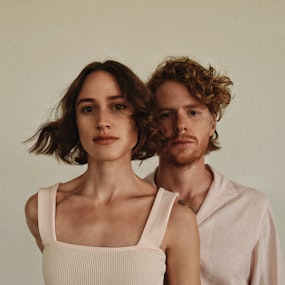
The Ballroom Thieves
Musician
Early in 2020, an article was released declaring that the music industry needed more happy songs. As Martin Earley and Calin Peters recall, they laughed while reading it, knowing that their work as The Ballroom Thieves explores the spirit of that paradigm. Well, sort of…they're not interested in easily defined worldviews.
"We read that article and thought, 'how are we supposed to write happy songs right now?'" says Earley. "We don’t write happy songs, but this time we decided to try something new by pairing optimistic sounding music with dark lyrics. If the listener is not a lyrics person, they might not notice."
The Ballroom Thieves' fourth album, Clouds, is a song cycle born of mixed experiences and fueled by the power of imagination. The album is a lush meditation on longing to return to touring - to see different sunsets and cities. But, it's also a reflection of its difficulties, e.g., insomnia brought on by sleeping in different hotel rooms every night. After a major car accident and the departure of a band member, the duo has taken the duality of all these experiences and translated them into song.
"We miss exploring the country," says Peters. "The road offers us structure and it gives us something to write about. These past two years we learned just how much we love and need it.”
As they leaned into their wanderlust, themes became apparent - the idea of a life spent in motion ("Shine"), the power of the storm representing a relationship transformed into heartbre… Read More
Featured Episodes
Here are some great episodes to start with. Or, check out episodes by genre.
























